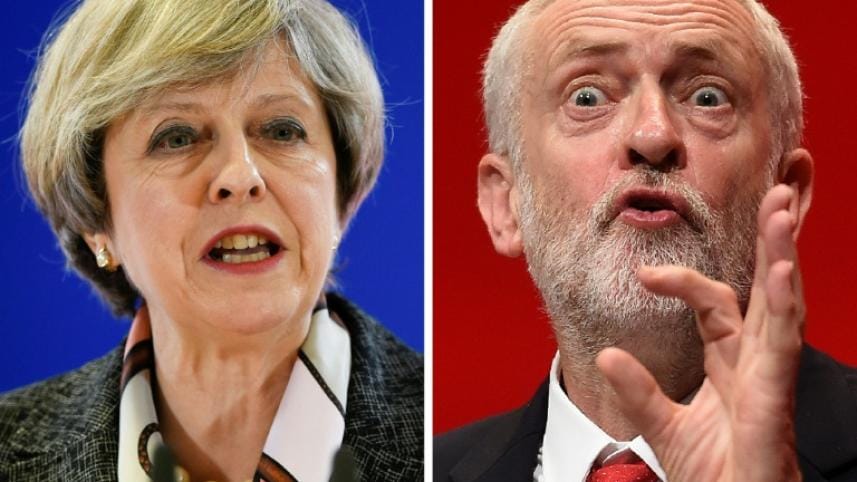Britain plunged into uncertainty as May tipped to lose majority

Prime Minister Theresa May was poised to win Britain's snap election Friday but lose her parliamentary majority, according to a shock exit poll that plunged the country into uncertainty and cast doubt on who will govern as Brexit talks loom.
The pound fell sharply amid fears that the Conservative leader will be unable to form a government and could even be forced out of office, after a troubled campaign overshadowed by two terror attacks.
The exit poll published as voting closed late Thursday projected May's party could fall from 330 to 314 seats, short of an overall majority in the 650-seat House of Commons.
The main opposition Labour party, led by leftist Jeremy Corbyn, was on course to increase its number of seats from 229 to 266, according to the joint exit poll by Sky, the BBC and ITV.
May is now facing questions over her judgment in calling the election three years early, risking further upheaval as Britain negotiates a complicated exit from the European Union, the first country to leave the bloc.
"It if turns out as the exit polls are suggesting then Theresa May is going to have no parliamentary majority or a tiny one," said Professor Tony Travers of the London School of Economics.
"It is exactly the opposite of why she held the election and she then has to go and negotiate Brexit in that weakened position."
Sterling fell nearly two percent against the dollar from the level a day ago at $1.2719, as investors questioned who was now going to control the Brexit process.
Early results suggest the UK Independence Party (UKIP), which won 12.5 percent of the vote two years ago and was a driving force behind the Brexit vote, could be almost wiped out.
Meanwhile the pro-European Liberal Democrats, who have campaigned for a second EU referendum, were projected to increase their number of seats from nine to 14.
In Scotland, where First Minister Nicola Sturgeon has called for independence to avoid a hard break with the EU, her Scottish National Party was tipped to lose up to 20 of its 54 seats.
"Britain on a knife edge" headlined the Daily Mail's early edition Friday, while the Daily Mirror had a picture of May and the caption "Hanging by a thread". The Sun splashed: "Mayhem."
- 'Pressure to resign' -
May, who took over after last year's Brexit referendum, began the formal two-year process of leaving the EU on March 29.
Days later she called the election, urging voters to give her a stronger mandate to take Britain out of Europe's single market in order to control immigration.
Officials in Brussels were hopeful the election would allow her to make compromises, but this now seems in question.
"A hung parliament is the worst outcome from a markets perspective as it creates another layer of uncertainty ahead of the Brexit negotiations and chips away at what is already a short timeline to secure a deal for Britain," said Craig Erlam, senior market analyst at OANDA currency traders.
Despite campaigning against Brexit, Labour has accepted the result but promised to avoid a "hard Brexit", focusing on maintaining economic ties with the bloc.
Barely a month ago, the centre-left party seemed doomed to lose the election, plagued by internal divisions over its direction under veteran socialist Corbyn.
But May's botched announcement of a reform in funding for elderly care, a strong grassroots campaign by Corbyn and the terror attacks, which increased scrutiny of her time as interior minister, changed the game.
"It seems clear her gamble has not paid off," said Paula Surridge, senior lecturer at the University of Bristol.
"Even if she manages to get just enough seats it will be seen as a failure and she may indeed be under pressure to resign as leader quite quickly."
Former finance minister George Osborne, who May sacked when she took over, said that if she loses seats then "I doubt she will survive in the long term as Conservative party leader".
Corbyn, who promised an end to austerity in huge rallies in the final days of the campaign, said: "Whatever the final result, our positive campaign has changed politics for the better."
- Terror in the campaign -
Britain has been hit with three terror attacks since March, and campaigning was twice suspended.
A suicide bomber blew himself up outside a pop concert in Manchester on May 22, killing 22 people.
Last Saturday, three assailants wearing fake suicide vests mowed down pedestrians and launched a stabbing rampage around London Bridge, killing eight people before being shot dead by police.
The attacks led to scrutiny over May's time as interior minister from 2010 to 2016, particularly since it emerged that some of the attackers had been known to police and security services.
Labour seized on steep cuts in police numbers implemented as part of a Conservative austerity programme, although May insisted she had protected funding for counter-terrorism.
At a polling station in Hackney in east London, a Labour stronghold, 41-year-old Simon Bolton said he favoured May because he was confident she would get the "best possible deal for Brexit".
But Labour voters said they were concerned about the impact of seven years of austerity on the National Health Service and schools.
"The Tories have just been devastating," said Ben Thomas Smetton, a 28-year-old doctor voting near the scene of last Saturday's terror attack.



 For all latest news, follow The Daily Star's Google News channel.
For all latest news, follow The Daily Star's Google News channel.
Comments